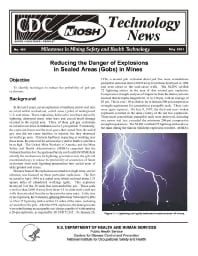Mining Publication: Technology News 489 - Reducing the Danger of Explosions in Sealed Areas (Gobs) in Mines
Original creation date: May 2001
Authors: National Institute for Occupational Safety and Health
NIOSHTIC2 Number: 20021623
U.S. Department of Health and Human Services, Public Health Service, Centers for Disease Control and Prevention, National Institute for Occupational Safety and Health, Technology News 489, 2001 Jun :1-2
In the last 6 years, seven explosions of methane and/or coal dust occurred within worked-out, sealed areas (GOBS) of underground U.S. coal mines. These explosions, believed to have been started by lightning, destroyed many mine seals and caused much damage external to the sealed area. Three of these gob gas explosions occurred in one mine in Alabama over a 3-year period. Fortunately, the explosion forces and the toxic gases that vented from the sealed gob area did not cause fatalities or injuries, but they destroyed several large seals. If miners had been inspecting or working near these areas, the potential for serious injury and/or death would have been high. The United Mine Workers of America and the Mine Safety and Health Administration (MSHA) requested that the National Institute for Occupational Safety and Health (NIOSH) help identify the mechanisms for lightning penetration into the gob and recommend ways to reduce the probability of occurrence of future explosions from such lightning penetrations into sealed areas of underground coal mines.

NIOSHTIC2 Number: 20021623
U.S. Department of Health and Human Services, Public Health Service, Centers for Disease Control and Prevention, National Institute for Occupational Safety and Health, Technology News 489, 2001 Jun :1-2